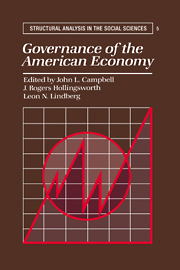Book contents
- Frontmatter
- Contents
- List of figures
- List of tables
- List of contributors
- Preface
- I Conceptual and historical foundations
- II Empirical studies of governance transformations in the United States
- 3 Transformations in the governance of the American telecommunications industry
- 4 Contradictions of governance in the nuclear energy sector
- 5 The statist evolution of rail governance in the United States, 1830–1986
- 6 Governance of the steel industry: What caused the disintegration of the oligopoly?
- 7 Governance of the automobile industry: The transformation of labor and supplier relations
- 8 The dairy industry: From yeomanry to the institutionalization of multilateral governance
- 9 Economic governance and the American meatpacking industry
- 10 The invisible hand in healthcare: the rise of financial markets in the U.S. hospital industry
- III Theoretical evaluation of the empirical cases
- References
- Index
9 - Economic governance and the American meatpacking industry
Published online by Cambridge University Press: 21 March 2010
- Frontmatter
- Contents
- List of figures
- List of tables
- List of contributors
- Preface
- I Conceptual and historical foundations
- II Empirical studies of governance transformations in the United States
- 3 Transformations in the governance of the American telecommunications industry
- 4 Contradictions of governance in the nuclear energy sector
- 5 The statist evolution of rail governance in the United States, 1830–1986
- 6 Governance of the steel industry: What caused the disintegration of the oligopoly?
- 7 Governance of the automobile industry: The transformation of labor and supplier relations
- 8 The dairy industry: From yeomanry to the institutionalization of multilateral governance
- 9 Economic governance and the American meatpacking industry
- 10 The invisible hand in healthcare: the rise of financial markets in the U.S. hospital industry
- III Theoretical evaluation of the empirical cases
- References
- Index
Summary
In recent years, the meatpacking industry has received public attention as an industry in turmoil. Bankruptcies, corporate restructuring, labor strikes, internal labor conflict, and wage reductions are typical themes in news reports on the industry. Although these reports present images of an industry undergoing major change, they rarely explore the fundamental political and economic properties so essential to understanding that change. This research begins such an effort by analyzing the changing nature of economic governance in the industry.
In presenting the history of governance transformations in the meatpacking industry, I employ the tools of analysis that were introduced in Chapter 1, particularly the heuristic model of the transformation process. In applying this framework, this chapter highlights markets and corporate hierarchy. Although other modes of governance have played a role, transitions to and from markets and corporate hierarchy have dominated the meatpacking industry. Thus, a central concern in this chapter is the conditions that facilitate transformations between these two forms of governance.
In tracing governance transformations, this study divides the history of meatpacking into three major time periods and follows a common format within each. First, each historical period begins with a discussion of economic changes and other pressures on the existing system of coordination. This discussion often highlights changing technology, but other factors are considered as well. Second, the search process is analyzed. The focus is on the role played by existing governance mechanisms and the state in successful or unsuccessful adaptations by economic actors to the new environment.
- Type
- Chapter
- Information
- Governance of the American Economy , pp. 259 - 292Publisher: Cambridge University PressPrint publication year: 1991
- 2
- Cited by

